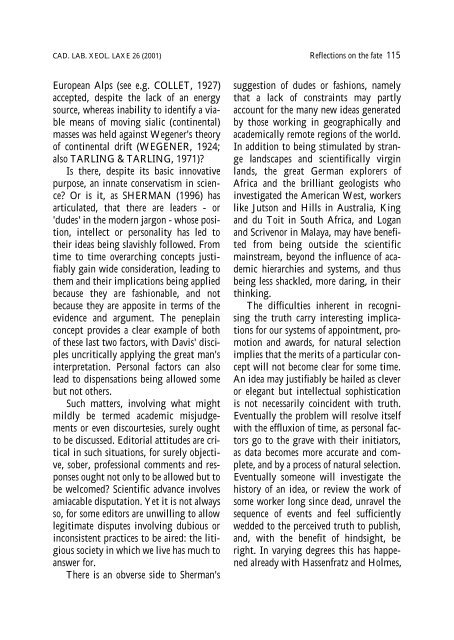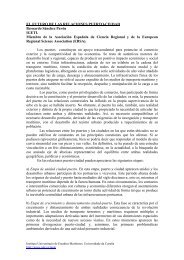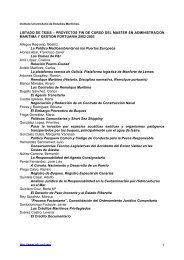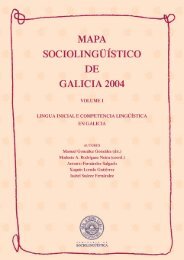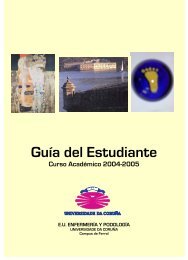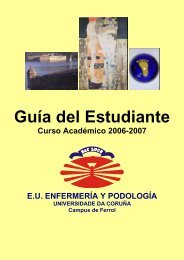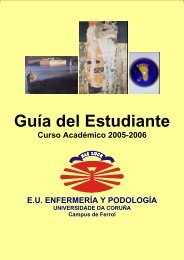- Page 11 and 12:
Cadernos Lab. Xeolóxico de Laxe Co
- Page 13 and 14:
CAD. LAB. XEOL. LAXE 26 (2001) Aná
- Page 15 and 16:
CAD. LAB. XEOL. LAXE 26 (2001) Aná
- Page 17 and 18:
CAD. LAB. XEOL. LAXE 26 (2001) Aná
- Page 19 and 20:
CAD. LAB. XEOL. LAXE 26 (2001) Aná
- Page 21 and 22:
CAD. LAB. XEOL. LAXE 26 (2001) Aná
- Page 23 and 24:
CAD. LAB. XEOL. LAXE 26 (2001) Aná
- Page 25 and 26:
CAD. LAB. XEOL. LAXE 26 (2001) Aná
- Page 27 and 28:
CAD. LAB. XEOL. LAXE 26 (2001) Aná
- Page 29 and 30:
CAD. LAB. XEOL. LAXE 26 (2001) Aná
- Page 31 and 32:
CAD. LAB. XEOL. LAXE 26 (2001) Aná
- Page 33 and 34:
CAD. LAB. XEOL. LAXE 26 (2001) Aná
- Page 35 and 36:
CAD. LAB. XEOL. LAXE 26 (2001) Aná
- Page 37 and 38:
CAD. LAB. XEOL. LAXE 26 (2001) Aná
- Page 39 and 40:
CAD. LAB. XEOL. LAXE 26 (2001) Aná
- Page 41 and 42:
CAD. LAB. XEOL. LAXE 26 (2001) Aná
- Page 43 and 44:
CAD. LAB. XEOL. LAXE 26 (2001) Aná
- Page 45 and 46:
CAD. LAB. XEOL. LAXE 26 (2001) Aná
- Page 47 and 48:
CAD. LAB. XEOL. LAXE 26 (2001) Aná
- Page 49 and 50:
CAD. LAB. XEOL. LAXE 26 (2001) Aná
- Page 51 and 52:
CAD. LAB. XEOL. LAXE 26 (2001) Aná
- Page 53 and 54:
CAD. LAB. XEOL. LAXE 26 (2001) Aná
- Page 55 and 56:
CAD. LAB. XEOL. LAXE 26 (2001) Aná
- Page 57 and 58:
CAD. LAB. XEOL. LAXE 26 (2001) Aná
- Page 59 and 60:
CAD. LAB. XEOL. LAXE 26 (2001) Aná
- Page 61 and 62:
CAD. LAB. XEOL. LAXE 26 (2001) Aná
- Page 63 and 64: CAD. LAB. XEOL. LAXE 26 (2001) Aná
- Page 65 and 66: CAD. LAB. XEOL. LAXE 26 (2001) Aná
- Page 67 and 68: CAD. LAB. XEOL. LAXE 26 (2001) Aná
- Page 69 and 70: CAD. LAB. XEOL. LAXE 26 (2001) Aná
- Page 71 and 72: CAD. LAB. XEOL. LAXE 26 (2001) Aná
- Page 73 and 74: CAD. LAB. XEOL. LAXE 26 (2001) Aná
- Page 75 and 76: CAD. LAB. XEOL. LAXE 26 (2001) Aná
- Page 77 and 78: CAD. LAB. XEOL. LAXE 26 (2001) Aná
- Page 79 and 80: CAD. LAB. XEOL. LAXE 26 (2001) Aná
- Page 81 and 82: CAD. LAB. XEOL. LAXE 26 (2001) Aná
- Page 83 and 84: CAD. LAB. XEOL. LAXE 26 (2001) Aná
- Page 85 and 86: CAD. LAB. XEOL. LAXE 26 (2001) Aná
- Page 87 and 88: CAD. LAB. XEOL. LAXE 26 (2001) Aná
- Page 89 and 90: CAD. LAB. XEOL. LAXE 26 (2001) Aná
- Page 91 and 92: CAD. LAB. XEOL. LAXE 26 (2001) Aná
- Page 93 and 94: CAD. LAB. XEOL. LAXE 26 (2001) Aná
- Page 95 and 96: CAD. LAB. XEOL. LAXE 26 (2001) Aná
- Page 97 and 98: CAD. LAB. XEOL. LAXE 26 (2001) Aná
- Page 99 and 100: CAD. LAB. XEOL. LAXE 26 (2001) Aná
- Page 101 and 102: 102 TWIDALE, C. R. CAD. LAB. XEOL.
- Page 103 and 104: 104 TWIDALE, C. R. CAD. LAB. XEOL.
- Page 105 and 106: 106 TWIDALE, C. R. CAD. LAB. XEOL.
- Page 107 and 108: 108 TWIDALE, C. R. CAD. LAB. XEOL.
- Page 109 and 110: 110 TWIDALE, C. R. CAD. LAB. XEOL.
- Page 111 and 112: 112 TWIDALE, C. R. CAD. LAB. XEOL.
- Page 113: 114 TWIDALE, C. R. CAD. LAB. XEOL.
- Page 117 and 118: 118 TWIDALE, C. R. CAD. LAB. XEOL.
- Page 119 and 120: 120 TWIDALE, C. R. CAD. LAB. XEOL.
- Page 121 and 122: Cadernos Lab. Xeolóxico de Laxe Co
- Page 123 and 124: 124 COKE et al. CAD. LAB. XEOL. LAX
- Page 125 and 126: 126 COKE et al. CAD. LAB. XEOL. LAX
- Page 127 and 128: 128 COKE et al. CAD. LAB. XEOL. LAX
- Page 129 and 130: 130 COKE et al. CAD. LAB. XEOL. LAX
- Page 131 and 132: 132 COKE et al. CAD. LAB. XEOL. LAX
- Page 133 and 134: 134 COKE et al. CAD. LAB. XEOL. LAX
- Page 135 and 136: 136 COKE et al. CAD. LAB. XEOL. LAX
- Page 137 and 138: 138 COKE et al. CAD. LAB. XEOL. LAX
- Page 139 and 140: 140 COKE et al. CAD. LAB. XEOL. LAX
- Page 141 and 142: 142 COKE et al. CAD. LAB. XEOL. LAX
- Page 143 and 144: 144 COKE et al. CAD. LAB. XEOL. LAX
- Page 145 and 146: 146 COKE et al. CAD. LAB. XEOL. LAX
- Page 147 and 148: 148 COKE et al. CAD. LAB. XEOL. LAX
- Page 149 and 150: 150 COKE et al. CAD. LAB. XEOL. LAX
- Page 151 and 152: 152 COKE et al. CAD. LAB. XEOL. LAX
- Page 153 and 154: 154 COKE et al. CAD. LAB. XEOL. LAX
- Page 155 and 156: Cadernos Lab. Xeolóxico de Laxe Co
- Page 157 and 158: 158 MENDIA et al. CAD. LAB. XEOL. L
- Page 159 and 160: 160 MENDIA et al. CAD. LAB. XEOL. L
- Page 161 and 162: 162 MENDIA et al. CAD. LAB. XEOL. L
- Page 163 and 164: 164 MENDIA et al. CAD. LAB. XEOL. L
- Page 165 and 166:
166 MENDIA et al. CAD. LAB. XEOL. L
- Page 167 and 168:
168 MENDIA et al. CAD. LAB. XEOL. L
- Page 169 and 170:
170 MENDIA et al. CAD. LAB. XEOL. L
- Page 171 and 172:
172 MENDIA et al. CAD. LAB. XEOL. L
- Page 173 and 174:
174 MENDIA et al. CAD. LAB. XEOL. L
- Page 175 and 176:
176 MENDIA et al. CAD. LAB. XEOL. L
- Page 177 and 178:
178 MENDIA et al. CAD. LAB. XEOL. L
- Page 179 and 180:
Cadernos Lab. Xeolóxico de Laxe Co
- Page 181 and 182:
182 THONON & CACHEIRO POSE CAD. LAB
- Page 183 and 184:
184 THONON & CACHEIRO POSE CAD. LAB
- Page 185 and 186:
186 THONON & CACHEIRO POSE CAD. LAB
- Page 187 and 188:
188 THONON & CACHEIRO POSE CAD. LAB
- Page 189 and 190:
190 THONON & CACHEIRO POSE CAD. LAB
- Page 191 and 192:
192 CACHEIRO POSE et al. CAD. LAB.
- Page 193 and 194:
194 CACHEIRO POSE et al. CAD. LAB.
- Page 195 and 196:
196 CACHEIRO POSE et al. CAD. LAB.
- Page 197 and 198:
198 CACHEIRO POSE et al. CAD. LAB.
- Page 199 and 200:
200 CACHEIRO POSE et al. CAD. LAB.
- Page 201 and 202:
202 CACHEIRO POSE et al. CAD. LAB.
- Page 203 and 204:
204 CACHEIRO POSE et al. CAD. LAB.
- Page 205 and 206:
206 CACHEIRO POSE et al. CAD. LAB.
- Page 207 and 208:
208 CACHEIRO POSE et al. CAD. LAB.
- Page 209 and 210:
210 CACHEIRO POSE et al. CAD. LAB.
- Page 211 and 212:
212 BENITO et al. CAD. LAB. XEOL. L
- Page 213 and 214:
214 BENITO et al. CAD. LAB. XEOL. L
- Page 215 and 216:
216 BENITO et al. CAD. LAB. XEOL. L
- Page 217 and 218:
218 BENITO et al. CAD. LAB. XEOL. L
- Page 219 and 220:
220 BENITO et al. CAD. LAB. XEOL. L
- Page 221 and 222:
222 VIDAL VÁZQUEZ et al. CAD. LAB.
- Page 223 and 224:
224 VIDAL VÁZQUEZ et al. CAD. LAB.
- Page 225 and 226:
226 VIDAL VÁZQUEZ et al. CAD. LAB.
- Page 227 and 228:
228 VIDAL VÁZQUEZ et al. CAD. LAB.
- Page 229 and 230:
230 VIDAL VÁZQUEZ et al. CAD. LAB.
- Page 231 and 232:
232 LÓPEZ PERIAGO et al. CAD. LAB.
- Page 233 and 234:
234 LÓPEZ PERIAGO et al. CAD. LAB.
- Page 235 and 236:
236 LÓPEZ PERIAGO et al. CAD. LAB.
- Page 237 and 238:
238 LÓPEZ PERIAGO et al. CAD. LAB.
- Page 239 and 240:
240 LÓPEZ PERIAGO et al. CAD. LAB.
- Page 241 and 242:
242 LÓPEZ PERIAGO et al. CAD. LAB.
- Page 243 and 244:
244 ULLOA GUITIÁN et al. CAD. LAB.
- Page 245 and 246:
246 ULLOA GUITIÁN et al. CAD. LAB.
- Page 247 and 248:
248 ULLOA GUITIÁN et al. CAD. LAB.
- Page 249 and 250:
250 ULLOA GUITIÁN et al. CAD. LAB.
- Page 251 and 252:
252 ULLOA GUITIÁN et al. CAD. LAB.
- Page 253 and 254:
254 ULLOA GUITIÁN et al. CAD. LAB.
- Page 255 and 256:
256 MORALES et al. CAD. LAB. XEOL.
- Page 257 and 258:
258 MORALES et al. CAD. LAB. XEOL.
- Page 259 and 260:
260 MORALES et al. CAD. LAB. XEOL.
- Page 261 and 262:
262 MORALES et al. CAD. LAB. XEOL.
- Page 263 and 264:
264 MORALES et al. CAD. LAB. XEOL.
- Page 265 and 266:
Cadernos Lab. Xeolóxico de Laxe Co
- Page 267 and 268:
CAD. LAB. XEOL. LAXE 26 (2001) Adub
- Page 269 and 270:
CAD. LAB. XEOL. LAXE 26 (2001) Adub
- Page 271 and 272:
CAD. LAB. XEOL. LAXE 26 (2001) Adub
- Page 273 and 274:
CAD. LAB. XEOL. LAXE 26 (2001) Adub
- Page 275 and 276:
CAD. LAB. XEOL. LAXE 26 (2001) Adub
- Page 277 and 278:
CAD. LAB. XEOL. LAXE 26 (2001) Adub
- Page 279 and 280:
282 VILA TABOADA et al. CAD. LAB. X
- Page 281 and 282:
284 VILA TABOADA et al. CAD. LAB. X
- Page 283 and 284:
286 VILA TABOADA et al. CAD. LAB. X
- Page 285 and 286:
288 VILA TABOADA et al. CAD. LAB. X
- Page 287 and 288:
290 WEINSTOCK, J. CAD. LAB. XEOL. L
- Page 289 and 290:
292 WEINSTOCK, J. CAD. LAB. XEOL. L
- Page 291 and 292:
294 WEINSTOCK, J. CAD. LAB. XEOL. L
- Page 293 and 294:
296 WEINSTOCK, J. CAD. LAB. XEOL. L
- Page 295 and 296:
298 WEINSTOCK, J. CAD. LAB. XEOL. L
- Page 297 and 298:
Cadernos Lab. Xeolóxico de Laxe Co
- Page 299 and 300:
CAD. LAB. XEOL. LAXE 26 (2001) New
- Page 301 and 302:
CAD. LAB. XEOL. LAXE 26 (2001) New
- Page 303 and 304:
CAD. LAB. XEOL. LAXE 26 (2001) New
- Page 305 and 306:
CAD. LAB. XEOL. LAXE 26 (2001) New
- Page 307 and 308:
Cadernos Lab. Xeolóxico de Laxe Co
- Page 309 and 310:
CAD. LAB. XEOL. LAXE 26 (2001) Foss
- Page 311 and 312:
CAD. LAB. XEOL. LAXE 26 (2001) Foss
- Page 313 and 314:
Cadernos Lab. Xeolóxico de Laxe Co
- Page 315 and 316:
CAD. LAB. XEOL. LAXE 26 (2001) Arch
- Page 317 and 318:
CAD. LAB. XEOL. LAXE 26 (2001) Arch
- Page 319 and 320:
CAD. LAB. XEOL. LAXE 26 (2001) Arch
- Page 321 and 322:
Cadernos Lab. Xeolóxico de Laxe Co
- Page 323 and 324:
328 CREGUT & FOSSE CAD. LAB. XEOL.
- Page 325 and 326:
330 CREGUT & FOSSE CAD. LAB. XEOL.
- Page 327 and 328:
332 CREGUT & FOSSE CAD. LAB. XEOL.
- Page 329 and 330:
334 CREGUT & FOSSE CAD. LAB. XEOL.
- Page 331 and 332:
336 CREGUT & FOSSE CAD. LAB. XEOL.
- Page 333 and 334:
338 CREGUT & FOSSE CAD. LAB. XEOL.
- Page 335 and 336:
340 CREGUT & FOSSE CAD. LAB. XEOL.
- Page 337 and 338:
342 ARGANT, A. CAD. LAB. XEOL. LAXE
- Page 339 and 340:
344 ARGANT, A. CAD. LAB. XEOL. LAXE
- Page 341 and 342:
346 ARGANT, A. CAD. LAB. XEOL. LAXE
- Page 343 and 344:
348 ARGANT, A. CAD. LAB. XEOL. LAXE
- Page 345 and 346:
350 VILA TABOADA & GRANDAL d’ANGL
- Page 347 and 348:
352 VILA TABOADA & GRANDAL d’ANGL
- Page 349 and 350:
354 VILA TABOADA & GRANDAL d’ANGL
- Page 351 and 352:
356 VILA TABOADA & GRANDAL d’ANGL
- Page 353 and 354:
358 VILA TABOADA & GRANDAL d’ANGL
- Page 355 and 356:
360 RABEDER & NAGEL CAD. LAB. XEOL.
- Page 357 and 358:
362 RABEDER & NAGEL CAD. LAB. XEOL.
- Page 359 and 360:
364 RABEDER & NAGEL CAD. LAB. XEOL.
- Page 361 and 362:
366 WITHALM, G. CAD. LAB. XEOL. LAX
- Page 363 and 364:
368 WITHALM, G. CAD. LAB. XEOL. LAX
- Page 365 and 366:
370 WITHALM, G. CAD. LAB. XEOL. LAX
- Page 367 and 368:
Cadernos Lab. Xeolóxico de Laxe Co
- Page 369 and 370:
CAD. LAB. XEOL. LAXE 26 (2001) Plei
- Page 371 and 372:
CAD. LAB. XEOL. LAXE 26 (2001) Plei
- Page 373 and 374:
CAD. LAB. XEOL. LAXE 26 (2001) Plei
- Page 375 and 376:
CAD. LAB. XEOL. LAXE 26 (2001) Plei
- Page 377 and 378:
CAD. LAB. XEOL. LAXE 26 (2001) Plei
- Page 379 and 380:
CAD. LAB. XEOL. LAXE 26 (2001) Plei
- Page 381 and 382:
CAD. LAB. XEOL. LAXE 26 (2001) Plei
- Page 383 and 384:
CAD. LAB. XEOL. LAXE 26 (2001) Plei
- Page 385 and 386:
CAD. LAB. XEOL. LAXE 26 (2001) Plei
- Page 387 and 388:
CAD. LAB. XEOL. LAXE 26 (2001) Plei
- Page 389 and 390:
CAD. LAB. XEOL. LAXE 26 (2001) Plei
- Page 391 and 392:
CAD. LAB. XEOL. LAXE 26 (2001) Plei
- Page 393 and 394:
Cadernos Lab. Xeolóxico de Laxe Co
- Page 395 and 396:
CAD. LAB. XEOL. LAXE 26 (2001) A re
- Page 397 and 398:
CAD. LAB. XEOL. LAXE 26 (2001) A re
- Page 399 and 400:
CAD. LAB. XEOL. LAXE 26 (2001) A re
- Page 401 and 402:
408 MAROTO et al. CAD. LAB. XEOL. L
- Page 403 and 404:
410 MAROTO et al. CAD. LAB. XEOL. L
- Page 405 and 406:
412 MAROTO et al. CAD. LAB. XEOL. L
- Page 407 and 408:
414 MAROTO et al. CAD. LAB. XEOL. L
- Page 409 and 410:
416 LÓPEZ GONZÁLEZ & GRANDAL d’
- Page 411 and 412:
418 LÓPEZ GONZÁLEZ & GRANDAL d’
- Page 413 and 414:
420 LÓPEZ GONZÁLEZ & GRANDAL d’
- Page 415 and 416:
422 LÓPEZ GONZÁLEZ & GRANDAL d’
- Page 417 and 418:
424 PINTO & ANDREWS CAD. LAB. XEOL.
- Page 419 and 420:
426 PINTO & ANDREWS CAD. LAB. XEOL.
- Page 421 and 422:
428 PINTO & ANDREWS CAD. LAB. XEOL.
- Page 423 and 424:
Cadernos Lab. Xeolóxico de Laxe Co
- Page 425 and 426:
CAD. LAB. XEOL. LAXE 26 (2001) Cave
- Page 427 and 428:
CAD. LAB. XEOL. LAXE 26 (2001) Cave
- Page 429 and 430:
CAD. LAB. XEOL. LAXE 26 (2001) Cave
- Page 431 and 432:
CAD. LAB. XEOL. LAXE 26 (2001) Cave
- Page 433 and 434:
442 TSOUKALA et al. CAD. LAB. XEOL.
- Page 435 and 436:
444 TSOUKALA et al. CAD. LAB. XEOL.
- Page 437 and 438:
446 TSOUKALA et al. CAD. LAB. XEOL.
- Page 439 and 440:
448 WAGNER, J. CAD. LAB. XEOL. LAXE
- Page 441 and 442:
450 WAGNER, J. CAD. LAB. XEOL. LAXE
- Page 443 and 444:
452 WAGNER, J. CAD. LAB. XEOL. LAXE
- Page 445 and 446:
454 WAGNER, J. CAD. LAB. XEOL. LAXE
- Page 447 and 448:
Cadernos Lab. Xeolóxico de Laxe Co
- Page 449 and 450:
CAD. LAB. XEOL. LAXE 26 (2001) Cave
- Page 451 and 452:
CAD. LAB. XEOL. LAXE 26 (2001) Cave
- Page 453 and 454:
CAD. LAB. XEOL. LAXE 26 (2001) Cave
- Page 455 and 456:
466 PINTO & ETXEBARRÍA CAD. LAB. X
- Page 457 and 458:
468 PINTO & ETXEBARRÍA CAD. LAB. X
- Page 459 and 460:
470 PINTO & ETXEBARRÍA CAD. LAB. X
- Page 461 and 462:
472 PINTO & ETXEBARRÍA CAD. LAB. X
- Page 463 and 464:
474 PINTO & ETXEBARRÍA CAD. LAB. X
- Page 465 and 466:
476 PINTO & ETXEBARRÍA CAD. LAB. X
- Page 467 and 468:
Cadernos Lab. Xeolóxico de Laxe Co
- Page 469 and 470:
CAD. LAB. XEOL. LAXE 26 (2001) The
- Page 471 and 472:
CAD. LAB. XEOL. LAXE 26 (2001) The
- Page 473 and 474:
Cadernos Lab. Xeolóxico de Laxe Co
- Page 475 and 476:
CAD. LAB. XEOL. LAXE 26 (2001) Prel
- Page 477 and 478:
CAD. LAB. XEOL. LAXE 26 (2001) Prel
- Page 479 and 480:
CAD. LAB. XEOL. LAXE 26 (2001) Prel
- Page 481 and 482:
CAD. LAB. XEOL. LAXE 26 (2001) Prel
- Page 483 and 484:
CAD. LAB. XEOL. LAXE 26 (2001) Prel
- Page 485 and 486:
498 TREMUL et al. CAD. LAB. XEOL. L
- Page 487 and 488:
500 TREMUL et al. CAD. LAB. XEOL. L
- Page 489 and 490:
502 TREMUL et al. CAD. LAB. XEOL. L
- Page 491 and 492:
504 TREMUL & CALLIGARIS CAD. LAB. X
- Page 493 and 494:
506 TREMUL & CALLIGARIS CAD. LAB. X


